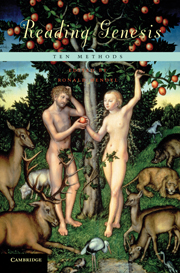Book contents
- Frontmatter
- Contents
- Contributors
- Acknowledgments
- Reading Genesis
- Introduction
- 1 Literature
- 2 Cultural Memory
- 3 Sources and Redaction
- 4 Gender and Sexuality
- 5 Inner-Biblical Interpretation
- 6 Rabbinic Interpretation
- 7 Interpretation in the Early Church
- 8 Translation
- 9 Modern Literature
- 10 Modern Theology
- Index of Biblical Citations
- General Index
10 - Modern Theology
Published online by Cambridge University Press: 05 June 2012
- Frontmatter
- Contents
- Contributors
- Acknowledgments
- Reading Genesis
- Introduction
- 1 Literature
- 2 Cultural Memory
- 3 Sources and Redaction
- 4 Gender and Sexuality
- 5 Inner-Biblical Interpretation
- 6 Rabbinic Interpretation
- 7 Interpretation in the Early Church
- 8 Translation
- 9 Modern Literature
- 10 Modern Theology
- Index of Biblical Citations
- General Index
Summary
What is theological interpretation?
Theological interpretation of the Bible is a contested concept. Even those who engage in the practice disagree among themselves as to what constitutes a theological reading. Many biblical scholars regard anything labeled “theological” as an enterprise of doubtful legitimacy in an academic context. Such skepticism is not without reason, but whether it is justified will depend, naturally enough, on the brand of theological interpretation that is proposed.
As New Testament scholar Richard Hays has recently argued, theological exegesis is not a “method” like, say, redaction criticism. Rather, he describes it as a practice, a way of approaching Scripture. Hays, like many theologically oriented exegetes, stands in a distinctly Protestant tradition inspired by Karl Barth's famous commentary on the Epistle to the Romans. Barth conceived of theological exegesis as making the text speak directly to the present:
By genuine understanding and interpretation, I mean that creative energy which Luther exercised with intuitive certainty in his exegesis…how energetically Calvin, having first established what stands in the text, sets himself to re-think the whole material and to wrestle with it, till the walls which separate the sixteenth century from the first become transparent! Paul speaks, and the man of the sixteenth century hears. The conversation between the original record and the reader moves round the subject-matter, until a distinction between yesterday and today becomes impossible.…Criticism (krinein) applied to historical documents means for me the measuring of words and phrases by the standard of that about which the documents are speaking – unless, indeed, the whole is nonsense.
- Type
- Chapter
- Information
- Reading GenesisTen Methods, pp. 196 - 214Publisher: Cambridge University PressPrint publication year: 2010



